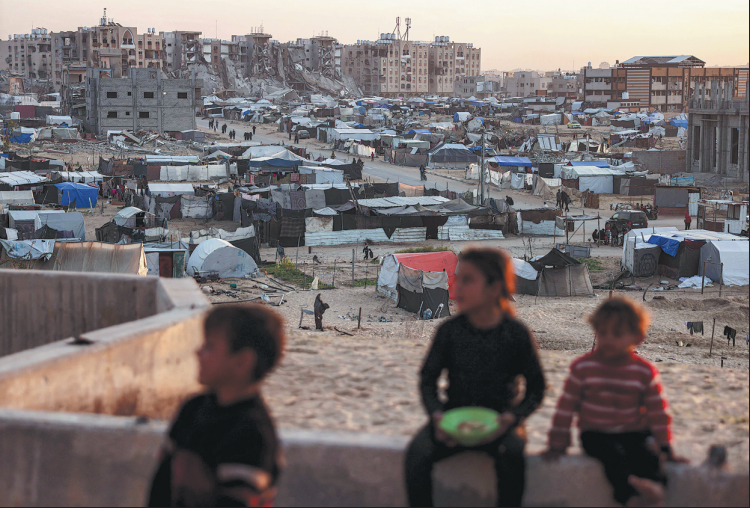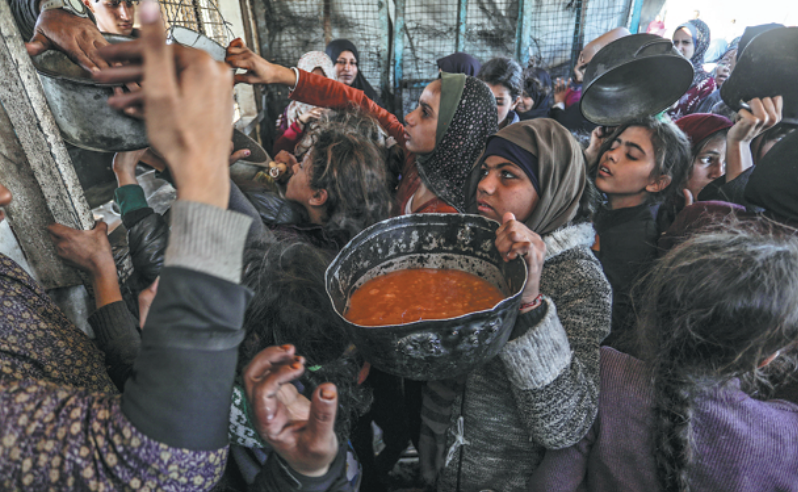
Children sit together overlooking tents sheltering Palestinians displaced in Khan Younis in the southern Gaza Strip on Sunday. BASHAR TALEB/AFP
At least to the chief of the embattled United Nations aid agency for Palestinian refugees, the yearlong conflict in the Middle East seems especially gloomy under incessant Israeli strikes on civilians and civilian infrastructure across the region, as, despite "all wars having rules", "all of those rules have been broken".

Philippe Lazzarini, commissioner-general of the United Nations Relief and Works Agency for Palestine Refugees in the Near East, or UNRWA, besides calling for a cease-fire in Gaza, said the world "must not become numb" in a post on X on Sunday.
Israeli attacks on civilians, aid workers, journalists, medical workers, schools and hospitals, with huge military backing from the United States, have become commonplace in the name of pursuing and rooting out Palestine's Hamas militants.
In besieged northern Gaza, in the barely functioning Kamal Adwan Hospital before Christmas, at least 20 patients and medical staff were injured, forcing the hospital president to issue an urgent plea, calling for a safe corridor for delivering essential aid to healthcare facilities.
Gaza-based NGO Palestinian Centre for Human Rights said in a statement published on Monday that the Kamal Adwan Hospital has been targeted over 20 times by Israeli forces in recent days, causing severe damage, including the burning of the ICU. Some 20 people, including patients and medical staff, were also injured. The Israeli army also detonated remote-controlled explosives and stated its intention to shut down the hospital and evacuate its patients.
UN Emergency Relief Coordinator Tom Fletcher had warned on Monday that the "near-total siege" of north Gaza was "raising the specter of famine", while conditions in extremely overcrowded south Gaza were creating "horrific living conditions and even greater humanitarian needs" with winter approaching.
According to an UNRWA report on Sunday, some parts of the North Gaza Governorate have been under a tightened siege for more than 10 weeks.
Access remained "extremely challenging" and its partners' ongoing attempts to deliver aid into these besieged areas "continue to be largely prevented", leaving up to 15,000 people without access to food, water, electricity, or healthcare.
At least 1.9 million people, or about 90 percent of the population, across the Gaza Strip have been displaced.
But even after more than 45,500 deaths in Gaza, including admissions of assassinations of Hamas leaders and militants and Hezbollah's top leaders in recent months, coordinated pager blasts in Lebanon, the bombing of the Iranian consulate in Damascus, orders from the world's top courts, arrest warrants, and UN resolutions and advisories, Israel has shown no signs of halting its military campaign, with women and children suffering maximum casualties.
The Israel Defense Forces had long claimed that Hamas had been using civilians as human shields. In a 2014 report on its website, the IDF claimed: "Innocent bystanders can be killed as a result of Hamas' abuse of its own civilians."
Israeli Prime Minister Benjamin Netanyahu has, on many occasions, defended Israel's right to self-defense since Hamas attacked Israel last year.

Palestinians line up to receive food in Khan Younis on Tuesday. ABED RAHIM KHATIB/ANADOLU/GETTY IMAGES
Unanswered questions
Imdad Ullah, assistant professor at the Centre for International Peace and Stability at the National University of Sciences and Technology in Pakistan, told China Daily that indeed Israel "was under attack on Oct 7, 2023. Yet, there remain several unanswered questions about the proportionality of the Israeli armed response. In many instances, the armed response seems to be crossing the thin line between legality and illegality when responding to an armed attack".
Ahmad Ghouri, a senior lecturer of the School of Law, Politics and Sociology at the University of Sussex in England and managing editor of Revival Press, said Israel's right to self-defense "is not unlimited" and must comply with the principles of necessity and proportionality.
"Countries supporting Israel's actions under the guise of self-defense must ensure their support does not contribute to violations of international law," he added.
In November, the International Criminal Court, or ICC, issued arrest warrants for Netanyahu and former defense minister Yoav Gallant, together with a former Hamas commander, over alleged "war crimes" and "crimes against humanity". Israel told the ICC it would appeal against the arrest warrants and urged the ICC to suspend the warrants, pending the appeal.
Israeli fighters and bombs have been targeting schools, hospitals and refugee camps from Gaza to Lebanon, Syria, Yemen and even Iran, indicating Israel's military operations are no longer just about eliminating Hamas.
Tel Aviv, Washington and its allies have long designated Hamas as a "terrorist group". In 2019, former Malaysian prime minister Mahathir Mohamad had said at the 74th UN General Assembly that the creation of Israel by seizing Palestinian land and expelling its 90 percent Arab population was the root cause of terrorism.
This year, foreign leaders like Turkiye President Recep Tayyip Erdogan and Polish politician Grzegorz Braun had referred to Israel as a "terrorist state" amid widespread killings and destruction. The killing of many people and injuring of thousands in Lebanon through explosions of pagers used for communication are among those deemed as "terrorist acts" committed by Israel, according to analysts.
Ghouri of the University of Sussex said the conflict in Gaza and its expansion to other regions such as Lebanon, Iran and Syria underscore the need for a comprehensive and just resolution that adheres to international law and respects the rights of all parties involved.
Israeli assassination of former Hamas political chief Ismail Haniyeh in Teheran, as acknowledged by Israel's Defense Minister Israel Katz, the prolonged occupation of Syrian lands, bombings of Iranian facilities in Syria, and the deliberate killings of UN humanitarian workers, journalists and medical staff, can all lead to crime charges.
With women and children being the dominant casualties in Gaza's deadly statistics, Israel has also been accused of "ethnic cleansing" for its "genocidal attacks", war crimes, and even weaponization of aid.
Fatma Jamal Muhaisen, a nutritionist at the Al Helou International Hospital in Gaza City, has been witness to these atrocities. Every morning, her first view out of her window is of Palestinians, including children, crowding a truck, taking turns to fill their plastic containers with water amid limited supplies.
"I see women carrying two of these (containers of water) at once and (one who looked like) a 7-year-old carrying one (container) for a long distance," said Muhaisen.

Clean water has become a scarce commodity in Gaza as Palestinians wait for supplies on Nov 1. [Photo provided to China Daily]
Scenes of suffering
Muhaisen, who was displaced from the border town of Jabalia to the north of Gaza City, said many people who have been displaced from the north of Gaza have come to Al Helou hospital and almost all are victims of explosives and shelling.
"I have seen all kinds, sadly," Muhaisen told China Daily. "Regarding the children I have seen, sometimes mothers with 5- to 7-year-olds come to me for baby milk formula to feed their children because they don't have anything else to feed them, which is really sad."
UN agencies and international humanitarian groups have accused Israel of weaponizing aid.
On Dec 19, the UN General Assembly passed a resolution requesting an advisory opinion from the International Court of Justice regarding Israel's responsibilities to facilitate aid to Palestinians provided by states and international organizations.
Drafted by Norway, the resolution passed with 137 votes in favor in the 193-member assembly. Israel, the US, and 10 other nations opposed it, while 22 countries abstained.
Describing the situation in Palestine as a "catastrophic" crisis that has evolved into a "dystopian nightmare", Andreas Kravik, deputy minister of Foreign Affairs of Norway, emphasized the international community's obligation to respond.
Israel has repeatedly rejected claims it was restricting aid in Gaza, alleging that international organizations had failed to distribute the aid because of looting by Hamas.
However, a UN update on Monday said since the launch of the ground offensive by Israeli forces in northern Gaza, only 3 percent of food and water deliveries organized by the UN World Food Programme, or WFP, have been permitted to enter areas in northern Gaza.
The WFP had made 101 requests for allowing food delivery to areas in Gaza's north governorate since the offensive began but only three have been approved, including the Dec 20 convoy, according to the UN.
Israel passed a law in October banning the UNRWA from operating in the country. The country's legislation that drafted the law cited the involvement of some UNRWA staff members in the Oct 7, 2023, attack, linking them to Hamas and other armed groups, but without evidence.
Saul Takahashi, former deputy head of the Office of the United Nations High Commissioner for Human Rights in occupied Palestine, said that Israel being held accountable is the only way international law and the institutions created to uphold international law "will regain any kind of credibility".
"Israel has been allowed to flout international law nonstop for decades without any consequences. That is in stark contrast to, for example, how the influential Western powers have treated Russia or Iran, the double standards are blatant," Takahashi, who is also a professor of human rights and peace studies at Osaka Jogakuin University in Japan, told China Daily.
Despite Israel's behavior, Omar Awadallah, Palestine's assistant foreign minister for the UN and Specialized Agencies, said they do not think international law has lost its credibility.
"The international law says that Israel is committing plausible genocide. The international law says that Israel violates all the international laws and norms… So we believe the credibility of international law is still there," said Awadallah.
"But unfortunately, there is a big failure by some countries to abide by the international law. The problem is in implementing the international law," he added.
The US has single-handedly vetoed resolutions of the United Nations Security Council on the conflict a couple of times this year.
Awadallah emphasized that the next step is to take action, not by condemning the illegalities of Israel, but "to confront the illegalities that Israel is doing in occupied Palestinian territories".